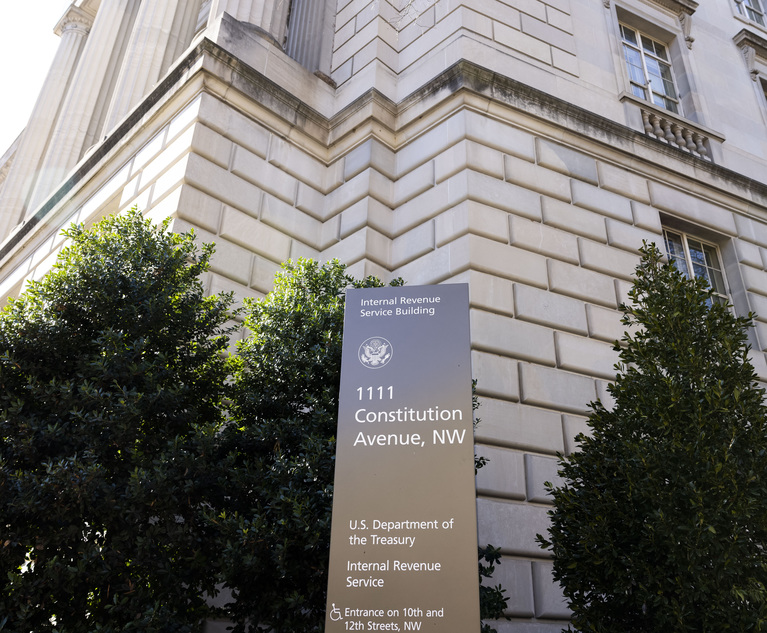On Feb. 28, 2023, the U.S. Supreme Court handed a rare victory to taxpayers facing extremely harsh IRS penalties for failing to timely or accurately file Foreign Bank Account Reports (FBARs).
In a 5-4 decision in Bittner v. United States, 215 L. Ed. 2d 1 (2023), the Supreme Court held that the $10,000 per violation non-willful FBAR penalty, contained in 31 USC § 5321, applies only to each FBAR and not to each account listed in that FBAR. In deciding Bittner, the Supreme Court resolved a conflict between the U.S. Court of Appeals for the Ninth Circuit, which held that non-willful FBAR penalties apply on a per FBAR basis only (United States v. Boyd, 991 F.3d 1077 (9th Cir. 2021)) and the Fifth Circuit, which upheld $2.7 million in non-willful per account FBAR penalties against Alexandru Bittner (Bittner, 19 F. 4th 734 (5th Cir. 2021)).
Bittner was born in Romania in 1957 and was educated there as a chemical engineer. He immigrated to the U.S. in 1982 (at age 25) and became a U.S. citizen in 1987. In 1990, after the collapse of the Soviet bloc, Bittner returned to Romania where he lived full time for the next 21 years. From at least 2007 through 2011, Bittner established a number of successful businesses and opened numerous accounts in Europe, far exceeding $10,000 in total. Bittner hired accountants in Romania and was fully compliant with his Romanian tax obligations, but was unaware that, as a U.S. citizen (even one living abroad full time), he had to file annual FBARs disclosing his foreign account holdings.
In 2011, Bittner returned to the U.S. and learned of his FBAR filing obligation. In May 2012, he hired a U.S. accountant who filed delinquent FBARs for him for the years 2007 through 2011 that unfortunately were deficient and did not identify all foreign accounts over which Bittner had signatory authority. In September 2013, after the IRS questioned the initial filings, Bittner hired a new CPA, who filed corrected FBARs. Nonetheless, the IRS asserted $10,000 per account penalties on all 272 accounts Bittner had opened in Europe between 2007 and 2011. The IRS also rejected Bittner’s request to be excused from any penalties based on his claim that, as a foreign-born person with no tax background living abroad full time, he had “reasonable cause” for not knowing of his FBAR filing obligations.
The Supreme Court did not address Bittner’s “reasonable cause” argument but rejected the IRS’s position that 31 USC § 5314 permitted it to assess $2.7 million in “per account” non-willful FBAR penalties against Bittner, finding the IRS’s position both (i) inconsistent with basic principles of statutory construction and (ii) contrary to the rule of lenity limiting the imposition of penalties without clear prior notice of their potential application.
While the Bittner decision was seen by many as an outright victory for taxpayers fighting per account non-willful FBAR penalty assessments, it remains to be seen whether the IRS now will simply stop asserting that the underlying violation was “non-willful” in the first instance and, instead, seek to characterize the violation as “willful” and impose the much higher “willful” FBAR penalties at the outset (the greater of $100,000 or 50% of the highest balance(s) in the account(s) on the violation date(s)). If so, the victory in Bittner will be a pyrrhic one.
The Basics of FBAR Reporting
In general, 31 USC §5314 requires any “U.S. person” (a citizen or permanent resident) who maintained ownership of or signatory or other control over one or more financial accounts at a foreign financial institution, which, at any point during a given year, had an aggregate balance in excess of $10,000, to file an FBAR by a certain date in the next year that discloses specific data points about each of the filer’s foreign accounts.
31 USC § 5321 establishes two different civil penalties—one for non-willful violations and one for willful violations—that could apply to a U.S. person violating 31 USC § 5314 reporting requirement (by either not timely filing the required FBAR or by filing an incomplete or inaccurate one). For non-willful violations, 31 USC §§ 5321(a)(5)(A) and (B) impose a penalty of up to $10,000, but relief is available for those who can establish non-compliance was excusable for “reasonable cause.” For “willful” violations, 31 USC §§ 5321 (a)(5)(C) and (D) provide for a penalty equal to the greater of $100,000 or 50% of the balance in any non-compliant account(s) on the “violation date.” No “reasonable cause” relief is available with respect to a willful violation.
IRS Use of Its FBAR Penalty Authority
To date, the IRS has been aggressive in asserting FBAR penalties both for willful and non-willful conduct and has been very stingy in granting “reasonable cause” relief from non-willful penalties. Indeed, as in Bittner, the IRS has asserted “per account” non-willful penalties in other cases involving large numbers of foreign accounts with significant balances, even where the facts seemed to justify minimum or even no penalties at all. This has led many commentators to suggest the IRS is using these penalties as a revenue raiser rather than a compliance tool.
Moreover, up until now, lower federal courts almost uniformly have agreed with the IRS that a taxpayer does not have to act intentionally to be subject to a civil willful FBAR penalty, finding knowing and reckless conduct to be sufficient. These courts have reasoned that reckless conduct includes signing one’s tax return without fully reading every line, which causes an objectively high risk of preventing oneself from learning of a FBAR filing violation based on what is not—but what should be—reflected on that return.
The recent Eleventh Circuit decision in United States v. Schwarzbaum, 24 F.4th 1355 (11th Cir. 2022), is one such egregious case. On facts not unlike those in Bittner, the Eleventh Circuit upheld over $12 million in willful FBAR penalties against a German-born U.S. citizen who inherited virtually all of the money in certain foreign accounts. Isac Schwarzbaum prepared FBARs but, based on advice from his return preparer, reported only the foreign accounts that reflected transfers to/from the U.S. Despite these facts, the Eleventh Circuit affirmed the trial court’s finding that Schwarzbaum’s conduct was “willful” because, in the FBAR context, reckless conduct (i.e., conduct presenting an unjustifiable high risk of harm that either is known or so obvious that it should be known) is sufficient for liability to be imposed. The Eleventh Circuit agreed with the trial court, which had held: “Although Schwarzbaum did not knowingly violate the FBAR reporting requirements, he acted recklessly when he reviewed the FBAR instructions in 2007 and then, for the next three years, failed to report the foreign assets those instructions directed him to report. … Schwarzbaum ‘was aware or should have been aware of a high probability of tax liability with respect to his unreported accounts’ and that, therefore his ‘FBAR violations for tax years 2007, 2008 and 2009 were willful.’”
The Eleventh Circuit also rejected Schwarzbaum’s argument that his conduct was not “willful” because he had relied on his accountant’s advice and distinguished the prior Supreme Court decision in United States v. Boyle, 469 U.S. 241 (1985), which held it was reasonable for a taxpayer to rely on advice given by a tax professional on a matter of tax law. The Eleventh Circuit held that (i) “Boyle concerned a different tax statute and did not provide the legal standard for willfulness in the FBAR context,” and (ii) “while it may be generally reasonable for a taxpayer to rely on professional advice, it is no longer reasonable once the taxpayer has realized—as Schwarzbaum should have, once he read the FBAR instructions—that he has been receiving bad advice.” Given this low bar for upholding willful FBAR penalties, it is reasonably foreseeable the IRS may respond to the Bittner decision by simply always asserting an FBAR violation was willful and imposing the more severe penalties.
In only one case has a lower court given any serious consideration to the argument that some fairly egregious conduct consistent with intentional noncompliance should be required for a “willful” FBAR penalty to be imposed. But, even in that case, Bedrosian v. United States, 42 F. 4th 174, 180 (3rd Cir. 2022), the Third Circuit ultimately held “reckless” conduct was established because the taxpayer knew or should have known the FBAR form he had signed was inaccurate” and “should have prompted him to investigate further, which he could have done easily by contacting the bank.”
Currently pending before the Supreme Court is a petition for certiorari from the Bedrosian decision. The court has directed the solicitor general to file a reply to the certiorari petition by April 15, 2023, suggesting the court may take the case as a follow-up to Bittner in construing the proper limits of the IRS’s penalty authority in FBAR matters. If the Supreme Court grants certiorari in Bedrosian and the taxpayer prevails (two big “ifs”), only then will the court effectively close the back door left open in Bittner, by requiring the IRS to establish actual willful conduct before being permitted to seek or assess the more draconian FBAR penalties (whether characterized as willful or non-willful).
Stay tuned!
Richard J. Sapinski is co-chair of the Sills Cummis & Gross tax fraud and controversy practice group.
Joseph B. Shumofsky is co-chair of the firm’s white-collar criminal defense practice group.
The views and opinions expressed in this article are those of the authors and do not necessarily reflect those of Sills Cummis & Gross.
NOT FOR REPRINT
© 2023 ALM Global, LLC, All Rights Reserved. Request academic re-use from www.copyright.com. All other uses, submit a request to asset-and-logo-licensing@alm.com. For more information visit Asset & Logo Licensing.



 Internal Revenue Service building in Washington, D.C, on Jan. 12, 2022. Photo: Diego M. Radzinschi/ALM
Internal Revenue Service building in Washington, D.C, on Jan. 12, 2022. Photo: Diego M. Radzinschi/ALM




